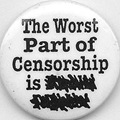 Over the last few days, a number of sources have reported on Apple’s decision to remove risqué applications from the app store, including swimsuit and lingerie applications. Over 5,000 applications have been purged in this sweep. Apparently parental restrictions just aren’t restricting enough; Apple exec Phil Schiller claimed Apple had been getting complaints from women about the “degrading” nature of the content.
Over the last few days, a number of sources have reported on Apple’s decision to remove risqué applications from the app store, including swimsuit and lingerie applications. Over 5,000 applications have been purged in this sweep. Apparently parental restrictions just aren’t restricting enough; Apple exec Phil Schiller claimed Apple had been getting complaints from women about the “degrading” nature of the content.
But there are some notable exceptions: apps from Sports Illustrated, Playboy, Victoria’s Secret, and other well-known corporate concerns. (Likewise, a bikini calendar app from the Hooters sports bar currently remains available, though its developer has not heard anything from Apple one way or the other.)
Even though a number of the removed apps reportedly do not feature images any racier than the Sports Illustrated Swimsuit Edition, and the very name Playboy has become a cliché for female nudity, these apps get to stay in the store. (However, Apple has since added back some of the more innocent apps removed in the sweep.)
When asked about the Sports Illustrated app, Mr. Schiller said Apple took the source and intent of an app into consideration. “The difference is this is a well-known company with previously published material available broadly in a well-accepted format,” he said.
VentureBeat’s “DigitalBeat” section suggests that the real difference is that a lot of these brands are owned by media conglomerate content partners—Time-Warner, in the case of Sports Illustrated—that own a lot of other content Apple would love to put on its iPhones and iPads.
DigitalBeat also thinks it likely that one of the more important reasons for the cleanup is that Apple wants to position the iPad as an education-friendly device, and an app store full of soft porn apps really doesn’t look good to potential school and family customers.
App Store Ambiguity
The double standard may rankle, but it’s part and parcel of a greater ambiguity we’ve covered before. As Ars Technica puts it:
The problem isn’t even that Apple considers the source or the intent or is interested in making sure the App Store is a friendly place for kids and parents. The problem is that all its various unpublished policies of what is acceptable and what is not are applied unevenly and at times arbitrarily. From a developer’s point of view, there’s no reliable way to know beforehand if an app will cross one of Apple’s invisible lines or not.
It also leaves e-books, and iBooks, in a position of ambiguity. Is iBooks going to enforce similar family-friendly values, rejecting erotica novels and books with harsh language? Probably not.
We’ve already covered the rejection of an e-book app for making it possible to read the Project Gutenberg edition of the Kama Sutra, and the rejection of an appbook version of David Carnoy’s novel Knife Music because it contained use of the “f-word”.
But the iTunes music and movie stores contain plenty of songs with explicit lyrics and R-rated movies with harsh language. The difference? Apparently only that they’re not apps. There is no reason to expect iBooks will be different.
A Frustrating Situation
Certainly the whole situation does not make the iPhone and iPad any more appealing to developers who have no way of knowing what might cause their apps to be rejected—even long after it was originally approved. It has to be particularly frustrating for the developers of the 5,000 apps that have been rejected, given that they thought they were playing by the rules.
Who knows what category of applications Apple might decide to reject tomorrow? Mobile Industry Review has a piece that asks this question:
How sure can you be that your application won’t be removed for some weird and wonderful reason? What happens if Apple decides to move into the baby market by creating a series of products and services for mothers-with-babies? Does that mean that Apple would switch off the thousands of baby applications currently in the store?
Potentially.
Or maybe not.
The problem is, we don’t know.
Even though I’m skeptical of the idea Apple might actually do it, I have to admit that it is at least possible they could decide that iBooks is the only e-book store Apple users need. Just because an app was approved in the past does not mean it is safe in the future.
At the same time Apple’s behavior makes me very nervous, I’m still very happy with my iPod Touch overall. On the one hand, Apple’s restrictions are annoying and disappointing. On the other hand, it does provide a good impetus for some company to come along and produce a better handheld device—and gives such a device plenty of frustrated developers ready to jump ship.
Update: Gizmodo notices that a new category for “Explicit” apps has quietly appeared in the App Store, though there are no applications in it yet. Might Apple be reacting to backlash against its broad-spectrum removal by creating a new private sandbox where these apps can live?
Update 2: Apparently not. Gizmodo now reports that the category has been removed again. Apple told a developer that it showed up by mistake, and that while Apple was considering adding such a category, "it’s not going to happen anytime soon."
































But does it really matter? Increased problems with the app store and what it allows will simply drive people back to the web… and unless Apple wants to remove their browsers, they can’t prevent consumers from doing whatever they want, through their web interfaces.
This is indicative of something I warned about when the iPhone came out: That spending too much effort on designing products for a proprietary interface was going to be more trouble in the long run. When today’s iPad becomes tomorrow’s Razr, those apps will be going nowhere. But web-based content will still be available.
“There is no reason to expect iBooks will be different.”
I would expect iBooks to be more akin to music–namely you will have some books that are rated “Adult”, much like music, and that parents can setup the iPhone so that kids can’t download “Adult” books or music.
(Of course, this means parents have to actually do this and they don’t want to–they want ‘somebody else’ to take care of their children. But that’s a whole other rant…)
But you have a very good point. One of the rules of the App Store is that you cannot create Apps that ‘compete’ with Apple’s own products. So if I talk to an author and get permission to make an App with his book (and pay him appropriate royalties, etc.) and now Apple comes along with their iBook Store and has made a deal with the publisher, and by extension the author, what happens to my book App? Will Apple suddenly send e-mails to 20,000 publishers saying, “Whoops! You didn’t compete with us before, but now you do. Sorry, buh-bye.” Will these Apps be banned from the iPad but allowed to remain on the iPhone? Will Apple stop accepting new ones but let the old ones live on?
And this is tough for a company that is trying to get investor dollars for creating an iPhone app. Before was the concern that, after investing hundreds of thousands of dollars, Apple will turn your App down. That concern is now perpetual.
Updated story to note that a new “Explicit” category has appeared in the app store.
Updated again to note that the “Explicit” category has been taken down.